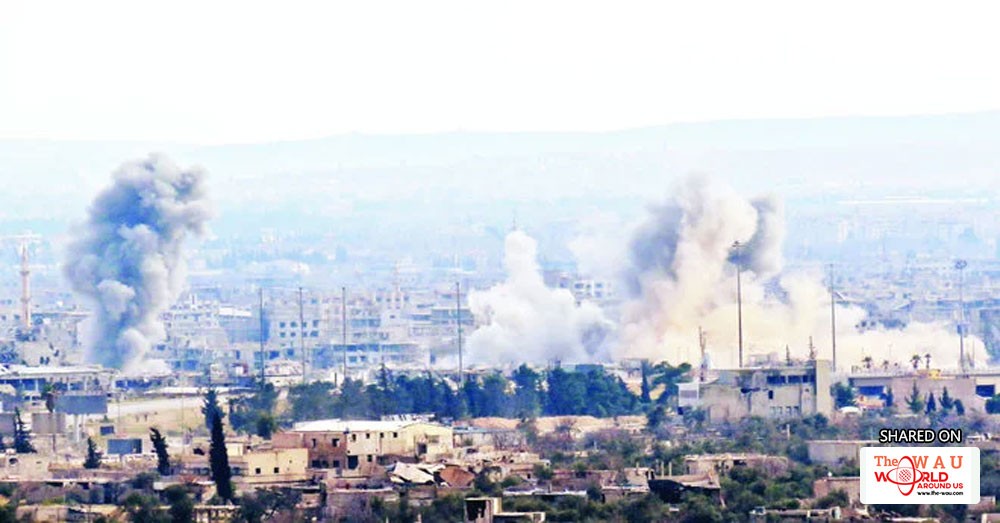Syrian government forces launched a ground assault on the edge of the opposition-held Eastern Ghouta enclave on Wednesday, seeking to gain territory despite a Russian plan for five-hour daily cease-fires, a war monitor and sources on both sides said.
Hundreds of people have died in 11 days of bombing of Eastern Ghouta.
The onslaught has been one of the fiercest of the civil war, now entering its eighth year.
The UN Security Council, including President Bashar Assad’s strongest ally Russia, passed a resolution on Saturday calling for a 30-day countrywide cease-fire, but it has not come into effect, with Moscow and Damascus saying they are battling members of terrorist groups excluded from the truce.
Russia has instead called for daily five-hour local cease-fires to establish what it calls a humanitarian corridor so aid can enter the enclave and civilians and wounded can leave.
The first such truce took place on Tuesday but quickly collapsed when bombing and shelling resumed after a short lull.
There were no airstrikes during Wednesday’s five-hour cease-fire, but heavy bombardment resumed in the afternoon, the Syrian
Observatory for Human Rights monitoring group reported. There has been no sign of aid delivered to the besieged area.
Moscow and Damascus have accused opposition forces of shelling the corridor to prevent people leaving. The opposition denies this and says people will not leave Eastern Ghouta because they fear the government. A senior US general accused Moscow of acting as “both arsonist and firefighter” by failing to rein in Assad.
Wednesday’s ground assault targeted the Hawsh Al-Dawahra area at the eastern edge of the opposition-held area.
The Observatory reported advances by the regime forces in the area, describing it as the resumption of an assault that first began on Feb. 25. It said opposition forces had inflicted heavy losses on regime forces.
An official with one of the opposition groups in Eastern Ghouta said fighters were battling to repel an attempted incursion, and characterized the battle as “back and forth.”
A commander in the military alliance that backs Assad said an elite unit of the Syrian army, the Tiger Force, was taking part in the assault and advances had been made.
France’s Foreign Ministry called on Russia and Iran, Assad’s other military ally, to exert “maximum pressure” on the Syrian regime to implement the 30-day cease-fire.
But with no sign of decisive international pressure to stop the attack, Eastern Ghouta appears on course to eventually meet the same fate as other areas won back by the regime in lengthy, punishing assaults, where opposition forces and civilians who oppose Assad were finally evacuated in negotiated withdrawals.
A senior Western diplomat said Russia appeared intent on a repeat of Aleppo in Eastern Ghouta by evacuating the area and then killing “the terrorists even if it’s not just Nusra,” a reference to a militant group with Al- Qaeda links.
Clash over chemical weapons
Diplomatic sources have said the chemical weapons watchdog, the Organization for the Prohibition of Chemical Weapons, opened an investigation into attacks in Eastern Ghouta to determine whether banned munitions were used.
The US said it has evidence regime forces have used chlorine, which is permitted for civilian purposes but banned as a weapon, in attacks in Eastern Ghouta and elsewhere.
US Disarmament Ambassador Robert Wood said on Wednesday that Russia has violated its duty to guarantee the destruction of Syria’s chemical weapons stockpile and prevent the Assad regime from using poison gas.
Russian Foreign Minister Sergei Lavrov said Syria had eliminated its poison gas stockpiles, and called allegations it was still using chemical weapons “absurd.”
Lavrov said militants entrenched in Eastern Ghouta were blocking aid and the evacuation of people who want to leave. Moscow would continue to support the regime forces in totally defeating the “terrorist threat,” Lavrov told the UN Human Rights Council in Geneva.
North Korean link found
North Korea sent items used in ballistic missile and chemical weapons programs to Syria along with missile technicians in violation of UN sanctions — and banned ballistic missiles systems to Myanmar, UN experts said.
The panel of experts monitoring sanctions against North Korea said its investigations into Pyongyang’s transfer of prohibited ballistic missile, conventional arms and dual-use goods found more than 40 previously unreported shipments to Syria between 2012 and 2017.
It said an unnamed UN member state also reported evidence of Myanmar’s receipt of a range of conventional weapons from North Korea including multiple rocket launchers and surface-to-air missiles in addition to ballistic missile systems.
The Associated Press reported on Feb. 2 that according to the experts’ report, North Korea was flouting UN sanctions on oil and gas, engaging in prohibited ballistic missile cooperation with Syria and Myanmar, and illegally exporting commodities that brought in nearly $200 million in just nine months last year.
AP obtained details from the more than 200-page report late on Tuesday, including the panel’s findings related to chemical weapons in Syria.
The report to the UN Security Council, which diplomats expect to be made public in mid-March, details “substantial new evidence” about North Korea’s dealings with Syria, dating back to 2008.
According to an unidentified member state, the North’s Ryonhap-2 Corporation was involved that year in a Syrian ballistic missile program, the “maneuverable re-entry vehicle (MARV) Scud D (MD) project,” the report said.
More recently, it said the August 2016 visit by a technical delegation from the Democratic People’s Republic of Korea — the country’s official name — “involved the transfer to Syria of special resistance valves and thermometers known for use in chemical weapons programs.”
That information came from another member state which also reported that North Korean technicians “continue to operate at chemical weapons and missile facilities at Barzeh, Adra and Hama,” the report said.
It quoted Syria’s reply to the panel about the reports: “There are no DPRK technical companies in Syria and the only presence of some DPRK individuals are confined in the field of sports under private individual contracts for training athletics and gymnastics.”
The experts added that they have not yet received a reply for documents supporting this claim and a list of all North Koreans who have traveled to Syria.
The panel said it also examined shipments interdicted by member states that were sent by the Chinese company Cheng Tong Trading Co. Ltd. to Damascus-based companies in 2016 and 2017.
The experts said 13 shipping containers were filled with “acid resistant tiles” which would cover 5,000 sq. meters, enough for a large-scale industrial project.
For many years, the panel said the DPRK Corst Co. acted on behalf of the Second Economic Committee, which is under sanctions, to ship goods to Syria for use in prohibited programs.
The panel said it received documents in July 2017 showing Corst shipped banned goods to a researcher at Syria’s Scientific Studies
Research Council, which the US says is the government agency responsible for developing and producing non-conventional weapons and the means to deliver them.
Share This Post












